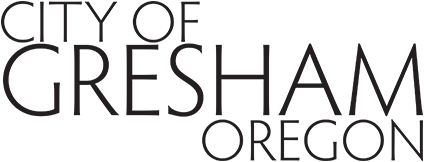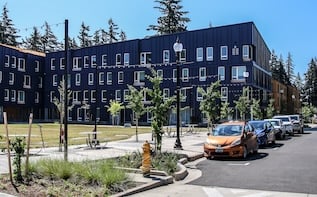- Home
- Government
- Climate Action
Climate Action
The Climate Action Plan is a set of strategies that guide the City and community as we work together to protect our environment and respond to the impacts of climate change.
Plan at a glance
- Climate Action Plan
- Core Focus Areas
- What You Can Do
- Appendices
The plan aims to make Gresham safe, healthy, sustainable and resilient. We will work together with community partners to reduce emissions and support those most affected by climate change.
Climate Action in Gresham: Building Resilience video
Climate Action Plan documents
- Climate Action Plan
- Executive summary
Sign up for Climate Action Plan updates.
- Buildings and energy
- Urban form and transportation
- Solid waste and consumption
- Community health and economic resilience
- Natural and built environment
- Internal City operations
Everyone can play a role in solving climate change. Learn about climate action household strategies that you can start today to help reduce emissions and prepare for the impacts of climate change.
- Appendix A: Climate 101 and Glossary of Terms
- Appendix B: Gresham Community Greenhouse Gas Emissions Inventory
- Appendix C: City of Gresham Greenhouse Gas Emissions Inventory 2017-2018
- Appendix D: Future Physical Conditions – How Will Climate Change Affect Gresham?
- Appendix E: Internal Operations and Facilities Sustainability Plan 2011
- Appendix F: Diversity, Equity, and Inclusion Tool and Co-benefits Framework
- Appendix G: Climate Action Plan Community Engagement Strategy
- Appendix H: Gresham Heat Strategy – in progress
Core Focus Areas
- Energy use in the largest source of greenhouse gas emissions in Gresham. These emissions come from the use of electricity and natural gas in homes, businesses, and industrial processes.
- To reduce emissions from buildings and energy the City and local partners will work together to:
- Increase energy efficiency in homes and businesses.
- Increase the amount of renewable energy that is supplied to the community.
- Transportation and land-use are the second largest source of greenhouse gas emissions in Gresham. These emissions come from vehicles and transit. The way a city is planned and developed has a major impact on how much residents need to use vehicles or transit to get around.
- To reduce emissions from urban form and transportation, the City and local partners will work together to:
- Support the development of safe bike and pedestrian-friendly infrastructure.
- Support urban planning practices that prioritize walking and access to public transit options.
- Support the use of electric vehicles and easy access to charging stations.
- Emissions from the way goods are made, transported, and then disposed of is a major source of greenhouse gas emissions in Gresham. These emissions come from the extraction of raw materials, the energy used in manufacturing or processing, transportation to stores, and the delivery of waste to landfills.
- In addition to emissions, waste has other major impacts on the quality of air, water, and land that we enjoy.
- To reduce emissions from solid waste and consumption, the City and local partners will work together to:
- Reduce food waste in homes and businesses.
- Support composting and food recovery programs.
- Support food access and security programs.
- Support opportunities for repair and reuse.
- Promote the use of materials that have low environmental impacts.
- Studies have shown that climate change presents a severe risk to both community health and economic vitality through conditions that can prevent businesses from opening, disrupt supply chains, and create hazardous living and working conditions.
- To support the community’s resilience to these conditions, the City and local partners will work together to:
- Support access to emergency preparedness resources, services, and information.
- Support access to weatherization resources that improve indoor health and safety.
- Support food access and security programs.
- Support workforce and skills training opportunities in climate projects.
- Studies have shown that climate change presents a severe risk to health of natural spaces and built infrastructure. These include roadways, bridges, sidewalks, and stormwater management infrastructure, along with urban tree canopy, parks, and greenspaces. Severe conditions such as extreme heat and ice storms can put severe stress and even damage these elements of a community.
- To support the community’s resilience to these conditions, the City and local partners will work together to:
- Maintain and improve tree canopy throughout Gresham
- Update City tree code to improve how urban trees are managed
- Support the use of permeable materials in hard infrastructure
- Support the creation of a network of air quality monitors.
Resources
Buildings and Energy
Community Energy Project
- Get support for weatherizing and repairing your home, stop leaks, and replace inefficient appliances.
- Get a free home energy score for income qualified households.
Electrify Now
- Learn how to reduce your home’s emissions through high-efficiency electric appliances and renewable energy.
- Learn how to access state and local incentives for high-efficiency electric appliances and renewable energy.
Energy Trust of Oregon - Residential
- Low and no-cost tips to save energy and money.
- Learn about DIY projects that will save additional energy and money.
- Explore DIY resources and cash incentives.
Energy Trust of Oregon – Rental
- Energy efficiency incentives for rentals.
- Energy-saving tips for renters.
Energy Trust of Oregon – Commercial
- Energy efficiency incentives for businesses in Oregon.
Portland General Electric
- Weatherize windows and doors to reduce energy lost when heating or cooling your homes.
Rewiring America
- Learn how to reduce your home’s emissions through high-efficiency electric appliances, vehicles and behaviors.
- Learn about how to access tax incentives and planning tools.
Unlimited Choices
- Get access to income-qualified home repairs that that boost safety, indoor air quality, weatherization and energy efficiency.
Oregon Community Solar
- Buy solar energy with no panels required through Oregon community solar.
- Available to renters and homeowners.
Portland General Electric
- Sign up for green power for your home.
Urban Form and Transportation
City of Gresham
- Download a Gresham bike trail map and guide.
- Gresham’s Safe Routes to School program partners with local schools to make walking and rolling to school fun and safe for students.
Get There Oregon
- Commuters: Learn about how to start or join a carpool, safe biking and bike routes, and how to use a transit planner.
- Employers: Learn how to encourage employee carpooling and active transportation with the Commute Solutions Toolkit.
Oregon Department of Transportation (ODOT)
- ODOT’s Innovative Mobility Program provides microgrants of up to $15,000 to support a range of activities such as bike lending libraries, bike shares, transit passes, transportation wallets, and bike helmets.
- ODOT’s Oregon Pedestrian and Bicycle Program provides informational resources on safe biking and walking, with printable signs and outreach materials.
Forth Mobility
- Interested in an electric vehicle or bike? Learn how to access incentives for electric transportation.
Solid Waste and Consumption
Ecochallenge
- Gather friends or coworkers to compete in an Ecochallenge to help start new sustainable habits.
Eat Smart Waste Less
- Save money wasting less food! Take on the Eat Smart Waste Less Challenge.
Choose to Reuse program
- Restaurants and grocery stores can save money by choosing reusable serviceware. Get involved in the Choose to Reuse program.
Oregon Metro
- Reduce your exposure to toxic chemicals through safer/greener cleaners.
Oregon Metro
- Can I recycle this?
- 503-234-3000
Community Health and Economic Resilience
American Red Cross
- Learn to make a family emergency plan and prepare essential supplies.
Energy Trust of Oregon
- Learn how to keep indoor air quality healthy during wildfire season.
Public Alerts
- Sign up for Public Alerts to get text notifications about oncoming hazardous conditions, how to prepare, and what resources are available.
- Alerts are available in 11 languages including: English, Spanish, Vietnamese, Chinese, Russian, Somali, Romanian, Ukrainian, Japanese, Arabic, and Lao.
Ready.Gov
- Get tips on low-to-no-cost emergency preparedness for a wide variety of hazardous conditions, such as making an emergency preparedness plan and building a go-bag for your home or business. Downloadable supply checklists and resources on how to prepare older adults, children, and pets are also available.
- Resources are available in 12 languages, including: English, Arabic, French, Haitian Creole, Hindi, Japanese, Korean, Portuguese, Russian, Tagalog, Vietnamese, and Simplified Chinese.
Regional Water Consortium
Learn how to prepare and store an emergency water supply. Visit the Regional Water Providers Consortium
Natural and Built Environment
Friends of Trees
- Get a free tree to plant at home.
- Read the Tree Care Guide.
- Participate in community tree plantings to revegetate areas vulnerable to extreme heat.
Growing Shade in Gresham
- Learn about Gresham’s tree canopy and why shade is important. Explore the interactive map that shows where Gresham has a lot of trees and where there are opportunities to plant more.
City of Gresham
- Disconnect your downspouts to save on your storm water bill.
- Upgrade your old toilet to a low-flow toilet and get a $50 rebate.
- Find other water conservation ideas.










